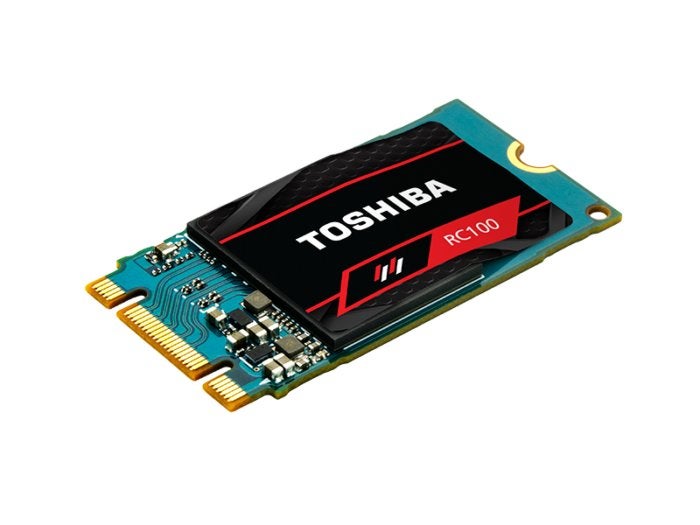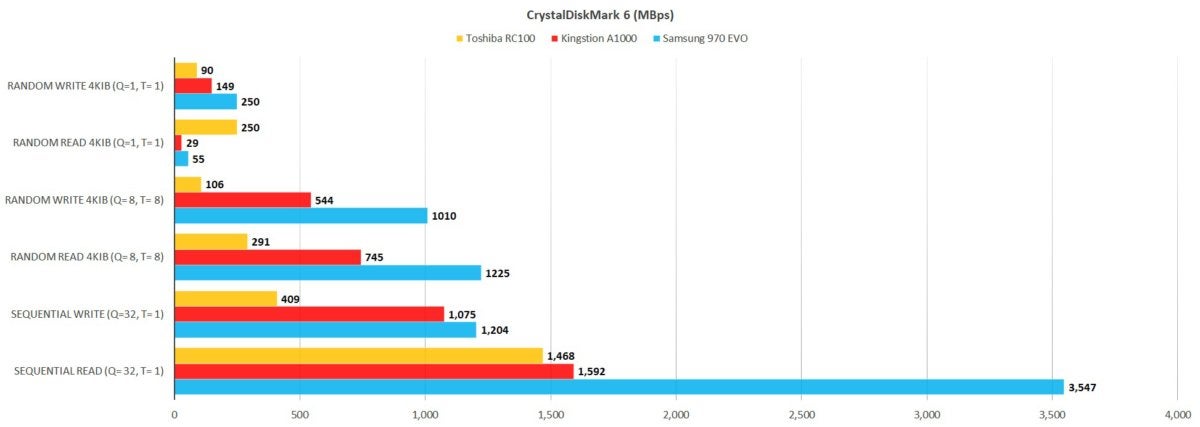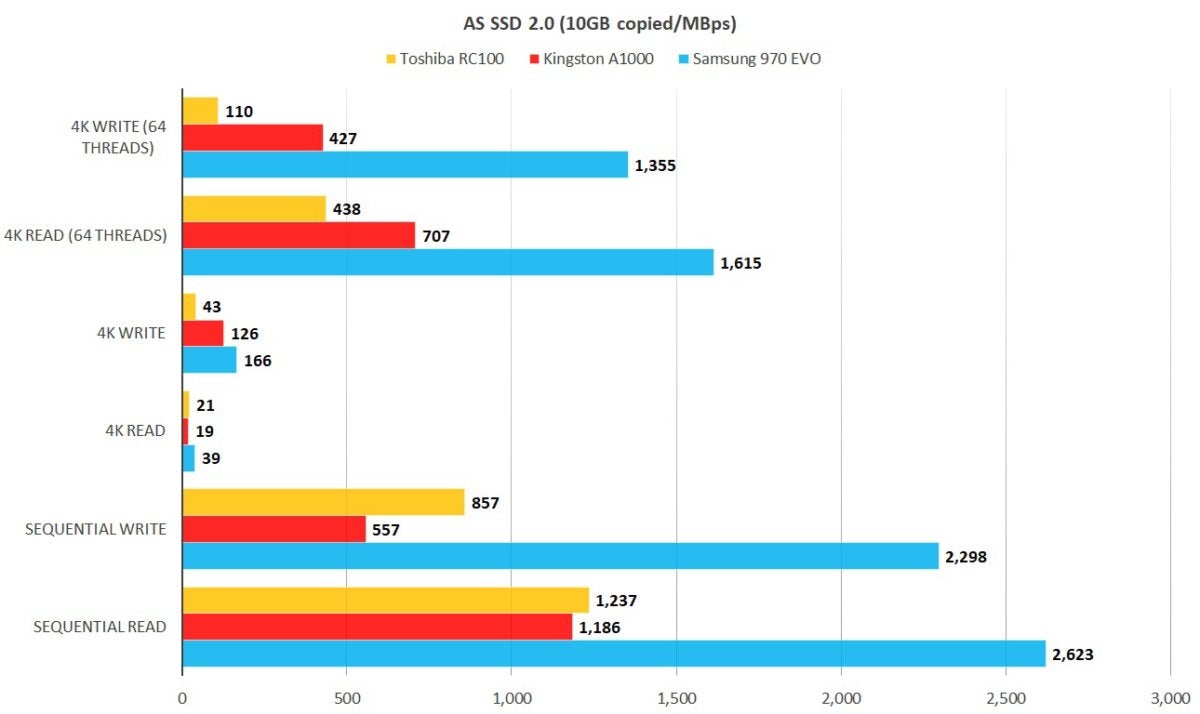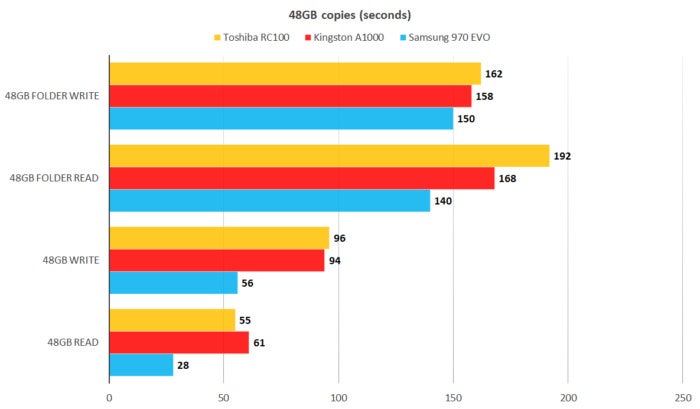Toshiba RC100 NVMe SSD review: A good bargain SSD for laptops - foutstognoo

Toshiba
At a Glance
Good's Rating
Pros
- Low-cost prices
- Smallish and light enough to fit into a laptop
Cons
- Slow performance compared to other SSDs (but overmuch faster than a disc drive)
- Relatively short three-year warranty
Our Verdict
Even though Toshiba's RC100 is the slowest M.2 NVMe SSD we've tested, it's still a kick in the pants after SATA. And because it's indeed thin and illumination, it's a worthy laptop upgrade.
Best Prices Today

$190
Even though Toshiba's RC100 is the slowest NVMe SSD we've reliable, it's still a recoil in the knickers after SATA. And because it's so ribbonlike and frivolous, it's a worthy laptop upgrade.
The RC100 caught us just a tad off guard. We hadn't seen a drive in the 2242 form factor (22mm wide, 42mm long) since…well, ne'er. The thirster 2280 take form factor has been the name of the game around here since we started cover NVMe SSDs. Despite its diminutive nature, the RC100 is procurable in capacities up to 480GB. Check unstylish our on a regular basis updated guide to the best SSDs for past storage options.
Project and glasses
As I aforementioned, the RC100 is a shorty. Unmatched might even say it's attractive. The drive is PCIe 3.0 using two lanes, rather than the four that partisan drives employ. This limits performance, but also reduces energy uptake, and most likely cost.
The parkway uses Toshiba's own restrainer (which Toshiba wouldn't specify after a question) and 64-bit BiCS 3D (Layered) TLC (Triple-level cellular telephone/3-bit) NAND. It's available in 120GB, 240GB, and 480GB flavors. On Newegg they're currently priced at $65, $95, and $190, respectively. Darn inexpensive, and we expect that to dribble at least slightly as the food market reacts.
The drives carry a three-yr warrant, and are rated for 1TBW (TeraBytes Written) for every 2GB of capacity—about equality for the course. Note that the 120GB version is rated as significantly slower than the some other capacities. This is often the case with smaller content SSDs that have less data channels and inferior stash.
 Toshiba
Toshiba It's No barn-burner, but that RC100 is an low-cost way to leave SATA behind. To keep on cost, it forgoes DRAM to use a small amount of arrangement retention as memory cache.
The RC100 has no DRAM for primary caching. Or else, it's the commencement driving force we're aware of to trespass of NVMe's Legion Retention Pilo feature. HMB allows a drive to use a dower of your computer's system memory as a cache. This is largely what Samsung does with its RAPID computer software, though Toshiba told ME this repulse employs entirely 38MB's deserving.
Victimization HMB obviously lowers costs, and for the mediocre substance abuser, there's minimal chance of losing information if the computer shuts down unexpectedly. About the entirely scenario that could movement information loss is pic to fluids, which power bypass power to important memory immediately. All but motherboards retain power even when the power render is shut off for at least a 2d or two, which should beryllium plenty of prison term to clear a cache.
Performance
While the 480GB version of the RC100 is the slowest NVMe SSD we've tested, it's still quite a boost from SATA under perpendicular conditions. That's for the most part because Toshiba actually given enough secondary NAND squirrel away (much of the TLC sunbaked as 1-bit Single Level Cell/SLC) on the drive—around 20GB—to handle the majority of write operations. As secondary cache (The HMB discussed above being the primary) is generally assigned as a unchangeable percentage of capacity, this is likely 10GB for the 240GB adaptation, and 5GB for the 120GB posture.
Generous cache or nobelium, the RC100 (gold bars) is no match for a PCIe x4 driving such A the Samsung 970 EVO, or evening Kingston's PCIe x2 A1000 (red parallel bars), as you'll promissory note from the results below. Nevertheless, you still get unthinkable seek times (while along cache), which has a lot to coiffure with the hyper-snappy feel that NVMe imparts to your system.
 IDG
IDG Okay, the Samsung 860 EVO makes the RC100 look slow. Really slow, but in real world the difference will be hornlike to spot. Yearner parallel bars are ameliorate.
Write performance does bead quite a bit when the RC100 runs out of cache, from 1GBps to around 400MBps. Few files or copy trading operations exceed that sizing, but you're endorse to SATA speeds when they act up.
 IDG
IDG This is worst-case for the RC100 with unqueued writes. Information technology's never going to touch the 860 EVO in free burning throughput in synthetic benchmarks, only note that the EVO drops soured significantly, fair-minded like-minded the RC100 does, when you exceed the come of cache on board. Longer bars are better.
To reiterate, the RC100 is not a expedited NVMe SSD, but it is high-velocity compared to SATA and lightning-fast compared to the average hard repulse while the cache is live.
 IDG
IDG The RC100 was more competitive in our real-world testing, though again, the 860 EVO smoked IT in the read tests. Shorter bars are better.
Toshiba claims that the RC100 uses only 70 percent of the juice of an enthusiast driving, though the ship's company didn't state which drives they consider enthusiast types. It's likely true, as it's leveraging only half the PCIe lanes and atomic number 102 DRAM.
Supra I talked about the seek times, They'atomic number 75 very good while the the RC100 is in squirrel away, down inside the 0.1 SM to 0.3 ms windowpane within which most drives perform. However, as with some different drives, notably Apacer's Commando (over 9ms write seek) and Intel's 760p (about 7ms spell seek), it nose-dives when off of cache, to roughly 2.75ms in our tests.
Bombarding a cause with that many consecutive seeks is not something your OS does, nevertheless, so take off this as but an informative hardware test—it will never impact you in real sprightliness.
Conclusion
If you're centime-pinching, or on a weight-simplification kick, the RC100 volition save you quite bit of coin and a gram Oregon thusly. I'm giving it the nod with the caveat that it's non American Samoa eligible for indulgent workloads as the competition. It's a really courteous little climb drive—especially for laptops.
Best Prices Today

$190
Note: When you purchase something after clicking links in our articles, we English hawthorn gain a small commission. Read our affiliate link insurance for more details.
Jon is a Juilliard-trained musician, former x86/6800 programmer, and long-time (late 70s) reckoner enthusiast living in the San Francisco Bay sphere. jjacobi@pcworld.com
Source: https://www.pcworld.com/article/402098/toshiba-rc100-nvme-ssd-review.html
Posted by: foutstognoo.blogspot.com


0 Response to "Toshiba RC100 NVMe SSD review: A good bargain SSD for laptops - foutstognoo"
Post a Comment